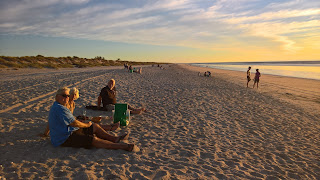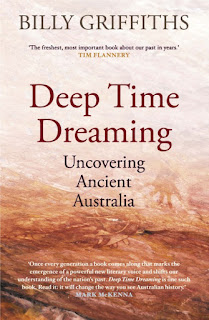railway tracks and active mines like BHP’s Yarrie, we arrived at Pardoo roadhouse on the bitumen of the great Northern Highway for its very last hot pie and a ginger beer. A short drive into Cape Keraudren to find a spot among the many caravans pitched up for their annual fishing and family holiday. Sitting with our green veg curry overlooking a mangrove-lined tidal inlet and out to sea in the sunset was pretty special. However one night among the generators and boozy gatherings was enough so we moved on to 80 Mile Beach caravan park, a very well groomed and managed affair with hedges and shady trees and beautiful long beach. Lo and behold we pitch up a row away from sister Annie and Graeme having some R&R before hosting their big family gathering in Broome.
Having relaxed time not exploring gorges has given us time to read, wash the sheets, perve on other rigs, and for Helen to reflect on a wonderful book just finished. It has illuminated many aspects of our journeying of the past 10 years as we have criss-crossed this ancient, beautiful but ecologically fragile and socially divided country. Deep Time Dreaming, uncovering ancient Australia by Billy Griffiths, Black Inc, 2018 is a beautifully written narrative history of the evolving discipline of Aboriginal Australian archaeology, and its interactions with science, culture, ecology, politics. I hadn’t realised for example that the successful campaign to save Tasmania's Franklin River, which swung the 1983 Federal election in Bob Hawke's favour, depended upon the work of archaeologists like Rhys Jones and others dating local sites back to the last Ice Age. Chapters include John Mulvaney on the Murray River, Jim Bowler at Mungo, Isabel McBryde in New England, the Goulds in Gibson Desert, and others - in 2017, the team at the Madjedbebe rock shelter near Kakadu confirmed that the first Australians arrived 65,000 years ago.
“It is a tale of the characters who dug the trenches,
of the Indigenous people who objected to the cavalier approach of the early
‘cowboy’ archaeologists, of the political reverberations of archaeological
finds within environmentally contested regions, of conflict and discovery and
the shifting relations between white and Indigenous Australia” (Kim Mahoud). It “explores what
it means to live in a place of great antiquity, with its complex questions of
ownership and belonging. It is about a slow shift in national consciousness…”.
I hope I live to see
white Australia acknowledge all that has been lost in the past 200 years since
colonisation, collectively recognise that the deep past has bequeathed a
living, complex Indigenous culture (the oldest in the world), and respect it to
make sure it endures. 


No comments:
Post a Comment